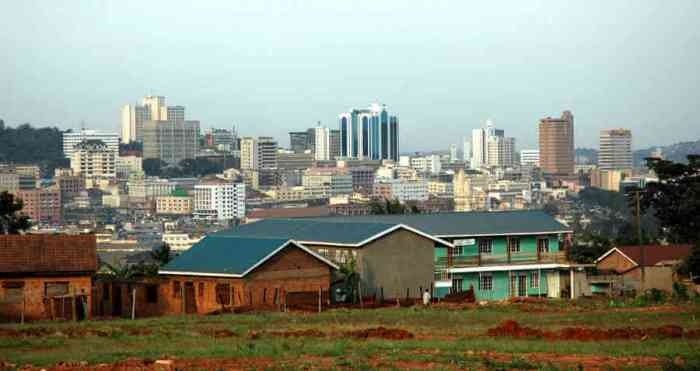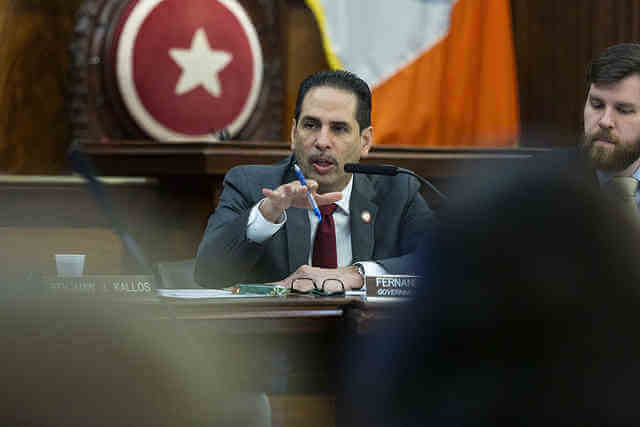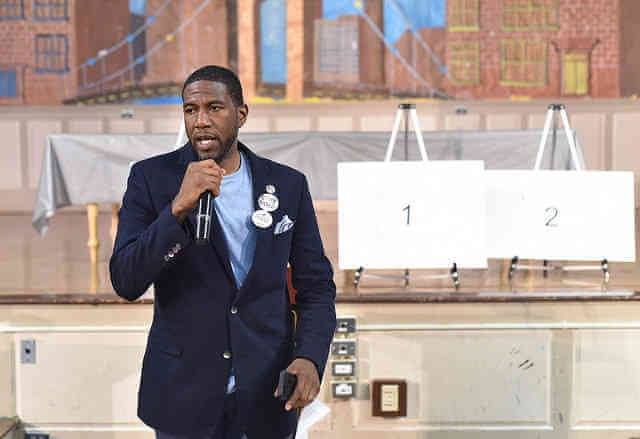PRINT COVER DESIGN BY MICHAEL SHIREY AND DANIEL SZYMCZYK
“I do feel safe,” said Frank Mugisha, a gay rights activist in Uganda. “But sometimes I get paranoid.”
With that, the East African nation’s most visible LGBT leader crystalized one of the paradoxes in his society’s posture toward homosexuality.
For more than five years, Uganda has been swept by a contentious debate over anti-gay legislation that would stiffen penalties for repeat “aggravated homosexuality” offenders to life imprisonment. The measure — widely known as the “Kill the Gays Bill” because in its early versions it mandated the death penalty — was temporarily enacted before being thrown out last August by a court based on flaws in how Parliament approved it. Among its provisions, it would have required anyone with knowledge of same-sex sexual conduct, on pain of criminal penalties, to report it to authorities.
LGBT rights leader navigates nation’s contradictory politics, fights Western evangelical provocations
In January 2011, amidst the mounting anti-gay turmoil, David Kato, the gay man previously most widely known in Uganda, was murdered in his home just weeks after prevailing in a lawsuit against the homophobic local newspaper Rolling Stone, which had published the names, photographs, and addresses of suspected gay people under the headline “Hang them.” The conviction of a man who the government said killed Kato after the victim demanded sex was viewed with deep suspicion by his fellow activists, who don’t believe justice was done in the case.
Yet Mugisha, who is the executive director of the group where Kato was once a leader — Sexual Minorities Uganda, or SMUG — sees his own visibility as an asset.
“Some people who are never in the media get harassed and beaten,” he told Gay City News in a recent interview in the Manhattan offices of Robert F. Kennedy Human Rights, a non-profit advocacy group. “I’ve lived in Uganda for a long time, and I know my way around. And with ordinary Ugandans, I do alright.”
And, said Mugisha, top among his concerns about the LGBT community’s future in Uganda is the ongoing interference of anti-gay American evangelicals in that nation’s political life.
Read Daniel Szymczyk's accompanying photo-essay from Uganda
From the other side of the political ledger, worldwide condemnation of Uganda over its rush toward more repressive anti-gay measures — homosexual conduct is already illegal there based on laws put in place during British colonial rule — has not been without positive impact, Mugisha explained.
“My president does not accept homosexuality,” he said of Yoweri Museveni, who has held office since 1986. “But he also does not want to antagonize the international community and he does not want to hear from us. He would rather the issue die out.”
During the four-plus years the anti-gay legislation was under consideration, Museveni took some steps that seemed aimed at slowing down its progress, but was also willing to fan the flames of homophobic feelings with inflammatory rhetoric. When Parliament moved the bill unexpectedly in late 2013, he seemed caught off guard and initially suggested there were technical flaws in the way it was voted on.
In the end, according to Mugisha, the president “was forced to engage,” and he signed the measure. In August of last year, the Constitutional Court of Uganda struck down the law along the lines Museveni had initially raised.
In response to criticism from abroad, Museveni has at times railed against Western interference, but that has been for local consumption, Mugisha said. The president is given pause when international corporations tell him they worry about the impact on their business an anti-gay crackdown could have, and he said Museveni was clearly embarrassed when two Texas hotels turned down his request to stay there during a 2014 visit to Irving and he was forced to rent a ranch.
Frank Mugisha, executive director of Sexual Minorities Uganda, during a recently visit to Robert F. Kennedy Human Rights in Manhattan. | GAY CITY NEWS
Mugisha acknowledged the difficulty in prescribing precisely what Westerners can do to help LGBT Ugandans, but urged them to consistently raise their voices — especially celebrities; “Ugandans love US celebrities,” he said. (In another media interview, he specifically mentioned the impact Jay-Z could have on opinion in Uganda). At the same time, like many LGBT activists in the developing world, he cautioned against Western leaders making “public statements that will make the situation worse for LGBT Ugandans.” Activists from outside Uganda, he said, should always take their cue from those on the ground.
International human rights groups can play a part by assisting activists in Uganda with research support on issues including international legal obligations and human rights standards. Mugisha singled out the efforts of Kerry Kennedy, a daughter of the late attorney general and New York senator who runs Robert F. Kennedy Human Rights. She twice met with Museveni to discuss the legal and policy conclusions her group and SMUG reached through their collaboration.
“It did influence his thinking,” Mugisha asserted. “They were probably his first meetings ever solely on LGBT rights.”
They were also meetings SMUG itself is not in a position to have. Which is not to say the group has no standing with the government. Mugisha recalled with a chuckle meeting with senior police officials and having them, during their time together, receive a call from an officer on patrol reporting the arrest of a gay man.
“At the highest levels, law enforcement at the highest levels are being careful,” he said. “They know that arrests and harassment will get lots of attention.”
When the senior official he was meeting challenged the officer calling about the grounds for the arrest he made, the cop answered, “I thought we were supposed to arrest them.”
Asked about such contradictions in policy and practice, Mugisha responded, “That’s what the Uganda political system is like. You can do something now and do something different the next day. You can’t trust politicians.”
Even without freedom of assembly, SMUG activists, from Mugisha’s account, are able to “make a lot of noise and get a lot of media.” Crucially, he emphasized, while “we are trying to change the laws, we don’t want a different government.”
And, in what he described as “definite headway” compared to the state of LGBT rights activism as recently as “seven to 10 years ago,” SMUG now gets support from other human rights groups in Uganda. The battle against the early proposals to incorporate the death penalty into the anti-gay legislation, he said, was critical in that respect.
Whatever freedom Mugisha feels in being visible in Ugandan politics, it’s clear authorities keep tabs on him. In a nation where, he estimated, only 25 people or so are active in the LGBT movement — with “five to seven of them truly visible” — and perhaps just 2,000 people are “out” in the Western sense of that word, he and some of his colleagues hosted a party four or five years ago for about 300 people. That was a “gamble” Mugisha acknowledged — gay parties in numerous places across Africa have been raided on charges they were illegal “gay weddings.”
“Nothing happened” in response to his party, he said, “but police knew about it. In later conversations, police indicated knowledge of the party.”
Mugisha readily acknowledges the hostility the LGBT community faces — from the nation’s president, from its Parliament, and in popular opinion that can at times foment an angry mob. But, it’s clear he locates his biggest enemies not in Uganda at all, but rather in the United States. In fact, with the representation of the Center for Constitutional Rights, SMUG is engaged in federal lawsuit against Scott Lively, the president of the Abiding Truth Ministries and a former official with the American Family Association, charging that his actions in working with Ugandan officials to pursue their anti-gay legislation qualifies as “persecution” under international law and is a crime against humanity. (Lively was a co-author of the notorious 1995 book “The Pink Swastika,” which alleged that gay men were “the true inventors of Nazism and the guiding force behind many Nazi atrocities.”)
Joined by several other stridently anti-gay American evangelicals, Lively traveled to Kampala in early 2009 to make a presentation to Ugandan leaders about what one of the event’s local organizers described as “‘the gay agenda — that whole hidden and dark agenda’ — and the threat homosexuals posed to Bible-based values and the traditional African family.” Though Lively subsequently sought to distance himself from the parliamentary measure, including the death penalty provision, that came alive within months of his visit, over the past two years both a district court judge and a federal appeals panel have declined to dismiss the case against him. One of the reasons for Mugisha’s recent US trip was to give deposition testimony in that case.
From Mugisha’s perspective, there has been a sea change in attitudes toward homosexuality since Lively and his evangelical colleagues began their Uganda campaign. Prior to about 15 years ago, Ugandans, he said, were largely indifferent — even if not particularly friendly — to LGBT people. In recent years, however, evangelical extremists in Uganda, like David Bahati, the member of Parliament who created the anti-gay legislation, have used homophobia to advance their ambitions. That push “got lots of encouragement from Lively,” according to Mugisha.
Since 2009, the stepped-up “anti-gay agitation” has “triggered” popular animosity toward the LGBT community. The popular view now, Mugisha said, is that homosexuality threatens children, is a Western import, and stands in opposition to religion.
“Religion is treated as sacred,” he said. “To go against religion is blasphemy. People say they don’t know homosexuals but that they’ve heard this about them.”
In such a climate, it is little surprise that Bahati says he stands prepared to move once again on anti-gay legislation. With less than a year left before elections, parliamentary leaders warn of a backlog of legislative priorities. According to Mugisha, however, because Parliament has gotten so little done on fundamental issues like public health and clean water, only corruption and the anti-gay law stand out in voters’ minds. Some in Parliament may therefore feel they should at least enact a version of Bahati’s legislation that survives court scrutiny to be able to say they did something.
This looming threat explains why Mugisha and SMUG hope the West and human rights activists in Uganda will continue to raise their voices. Speaking out only at the 11th hour simply encourages charges of outside interference. Discouraging the Ugandan government from acting in the first place is what Mugisha hopes world opinion can achieve.



































